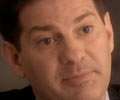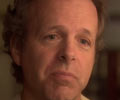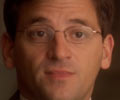- People
- Mark Halperin
- John Weaver
- Mark McKinnon
- Victoria Clarke
- Peter Baker
- Ryan Lizza
- Related Links
- The Unmaking of a President
GQ's story of the McCain campaign's stunning 2007 collapse. - In Loose Style, McCain Leads a Camp Divided
In this New York Times article, McCain describes the "healthy" amount of tension he thinks is necessary for making informed decisions. (Aug. 9, 2008)
Mark Halperin Time magazine; co-author, The Way to Win
 Read the full interview >
Read the full interview >
Part of McCain's problem as a manager and as a presidential candidate is that he does not have a central authority. He had several advisers with different titles, all of whom felt at any given moment that they were running the campaign or playing the biggest part in advising how things were going. That can sometimes be a strength, and they're all talented people. But I think part of his problem, part of why the campaign was on a bad trajectory, is there were too many people with too much authority decentralized in too many different places for there to be strong decisions and for there to be recognitions of problems.
Was he managing the money?
McCain is not a detail guy, so when he hired people to raise a lot of money for him and to spend a lot of money for him, he wasn't aware of the details and was stunned when he learned just how much had been spent on his behalf and on what kind of things. Not a lot of things that were going to help him get elected president. ...
When it falls apart, what happens to John McCain? What happens to the people around him?
McCain had to get rid of allies who had worked with him, particularly John Weaver. He had to rebuild his campaign, and he had to recognize that if you were going to win, it would have to be with a smaller operation, a different style of operation, and one, frankly, that was more suited to the way he likes to run for president.
John Weaver McCain chief political adviser, 1997-'07
 Read the full interview >
Read the full interview >
John McCain is quoted as sort of saying, "You know, I think that chaos is good." What's going on?
I don't know what else he could say, because chaos existed in the campaign portion that I was involved in, and it certainly exists now. And he can't make any more changes within his campaign structure between now and the general election. Chaos is not good in the campaign. It's not a healthy thing. You don't want your candidate in a bubble, where he doesn't get disparate viewpoints, and you want opposing views discussed and argued upon and firmly decided. But once they're decided, you want them acted upon, not continuously brought back to people's attention. So I would disagree with the senator about that. But I don't expect that he could say much else.
So why has this been a problem with this campaign?
As in a lot of organizations, if you don't get it right at the very beginning, it's not going to be right throughout. There was no clear chain of command. The finance division was totally separate from the political division. No one knew how much money we were raising, so we couldn't match spending with that. And that never got fixed, really, even with the departure of myself and with so many other talented people like [former campaign manager] Terry Nelson and [former communications director] Brian Jones and others leaving. When that happened, those shoes were really not filled, and the problems were not corrected. But to John's credit, he gritted it out and won the nomination.
Some people would say, though, that the chaos in the campaign and the inability to fix it reflects back on the candidate.
At the end of the day, all campaigns reflect the candidate. I think that's a fair statement. But I don't think that that necessarily would translate into what kind of president he would be.
How so?
Well, they're totally structured differently. And the political people that are involved in campaigns, at least in my conversations with John, would not have places of authority within the White House. You would not see a Karl Rove-type person in the White House overseeing domestic policy and sitting in on some foreign policy decisions, when their background is all political.
So I think he certainly understands the difference, and understands and wants a very strong Cabinet form of government. And I think he has a good idea of how to manage the White House.
Mark McKinnon Media adviser, McCain campaign, 2007-'08; media adviser, Bush re-election campaign

Candidates are always responsible for their campaigns. And McCain did the hardest thing in the world to do, which is he pulled the trigger on some people who'd been around him most of his political life, some people who were very close to him. He had to put a bullet in them. Pretty tough thing to do, but he made the tough decisions. He let some people go and then had to start from zero, had to start from absolute scratch.
Victoria Clarke Former McCain press secretary, 1983-'89

How does he like an office to operate? Does he like a lot of different opinions? ...
His way of operating -- again, this is the '80s, so we consider that the early years in John McCain -- was to hire good people and expect them to help him forge the agenda. He might disagree with you, but you were an adult at the table every single day. So he really expected people to stand up for what they believed in and argue with him if they thought he was wrong; really be an active member of the team, if you will. So he liked having people like that around him.
Every once in awhile we'd have a staff retreat in which we would talk about, OK, what's the long-term plan here? But it wasn't a highly structured conversation, or not as though there were documents that were put down on paper. He wasn't that kind of person. It was a more organic style of management, I think, but big expectations. He hired people for a reason. He expected them to participate and be coming forward with an agenda, rather than waiting for him.
Peter Baker The New York Times

John McCain's decision-making is little bit more freewheeling than, say, President [George W.] Bush's. It's less disciplined. It's less button-downed. It's much more from the gut. What you saw in the decision to choose [Alaska Gov.] Sarah Palin [as his running mate] was a last-minute rush to vet her as thoroughly as they could in the little time that they had left. She was interviewed by the McCain campaign's chief vetter only on Wednesday, the day before she met with John McCain on the Thursday of the Democratic Convention when he offered her the job. And only that day did they send a team up to Alaska to do its own research and prepare for what would come after the announcement.
They say they understood everything about her by the time they made the decision and that there were no surprises in the days that came after her announcement. If that's true that's fine, but it still didn't help them prepare for what would come. The vetting is supposed to not only turn up possibly disqualifying elements in somebody's background; it's also meant to prepare a campaign for how to handle the various issues that would come up after somebody's announced. And they seemed unable or unready to deal with some of the issues that would come up in the immediate aftermath of her announcement.
So the big question is, what does that say about McCain's judgment and his ability to make crucial decisions? ...
He is somebody who thinks outside of the box. He's not somebody who's going to stay locked into conventional lanes that people want to put him in. On the other hand, these decisions are going entail some degree of risk. He's willing to be daring and bold, but at the same time he's willing to risk a lot to do that.
It's a very different style of leadership than many politicians in Washington, who hew to the safe course because they're so afraid of making mistakes. John McCain's not afraid to make mistakes. …
... Is America ready for another president who makes calls by his gut? ...
McCain does make decisions by his gut, which is in some ways like President Bush. But the difference is I think that McCain is more willing to revisit his decisions and rethink whether he was right about things and decide he was wrong. He's much more introspective and much more willing to say: "I didn't do this right. That was not the best way to have done things."
For President Bush that's always been a difficult concept. It's not something he particularly likes doing, and certainly doesn't do very often in public. And so while they're both gut decision-makers, I think McCain has a different way of processing the decisions after they're made.

Just like Obama's [vice presidential selection] process was marked by what seems to have been its deliberation, its secrecy, which is in line with the way he's run his campaign, the McCain selection process, although secret -- [the choice] didn't leak out until the end -- does seem to have been quite chaotic.
So it does seem like it was classic McCain, where it was a scramble at the end. The campaign didn't have all of its ducks in a row. It's very clear that they didn't know certain things about Sarah Palin that the press found out almost immediately after she was picked.
I interviewed the Republican leader of the state Senate in Alaska a few days after Palin was picked; Lyda Green is her name. And she told me, "I didn't get a single call from a Republican or from a McCain person asking about this." So even Republican leaders in the state of Alaska weren't consulted or weren't asked for information on this woman. So it does seem like the vetting was cursory, quick.
I think there's an argument to be made that there was a certain recklessness with how McCain went about this. I covered McCain a lot in the primaries, and the argument that he made at almost every stop was that the number one issue in the world today is the rise of fundamentalist Islam, and that that was the issue that he was going to make his priority when he got to the White House. Now, you can't both say that and then pick someone who has absolutely no record, no public comments on this issue; someone who has never been associated with what you believe is the most important issue facing the world.
So I think the pick was more political than Obama's. It suggests that the McCain campaign believed that they were in a hole here, and that they had to do something extremely dramatic to get out of it, to actually win this race. But it was not a pick to help him govern the country; it was a pick to help him win this campaign.